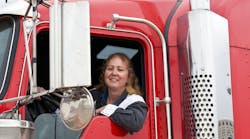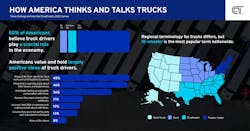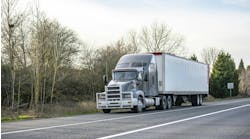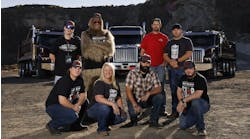How do America's truck drivers think the public views them? According to some, not very highly. While interviewing truck drivers for research purposes, Dr. Ethan Slaughter, the chief operating officer at Christenson Transportation in Strafford, Missouri, found that drivers often feel disrespected.
Slaughter, a presenter at this year's McLeod User Conference, told a group of fleet industry executives that when he interviewed drivers, he asked for examples of how drivers have been disrespected. Some mentioned being cut off in traffic, and another driver mentioned being disrespected at Walmart.
See also: McLeod rolls out new offerings to improve workflow
"He said, 'Every time I go to Walmart, people look at me like I'm a dirty, worthless, stupid truck driver,'" Slaughter recalled to the group.
Thankfully for truckers, perception isn't always reality.
CloudTrucks research surveyed 2,000 Americans to determine their perception of truckers. Respondents from all 50 states were categorized into regions: Northeast, South, Midwest, and West. The results proved Americans mostly view truckers in a favorable light. The survey also included a short quiz on what the average American knows about the trucking industry, as well as the most popular terminology for the trucks that keep America moving. Keep reading to see the survey results.
Americans' perceptions of truckers
Americans value and hold favorable views of truck drivers, according to survey results. Across all regions of the U.S., most Americans (80%) think truckers "play a crucial role in the economy." Almost half of respondents (43%) believe truckers "frequently" encounter unsafe or aggressive driving behaviors from other motorists. A third of respondents believe truck drivers are not adequately compensated for their work.
There were some differences in respondents' perceptions of drivers, however, with 21% of respondents imagining an older white male with tattoos and a rough appearance when they think of truck drivers, and 13% of respondents perceiving truckers as being reckless, disregarding safety precautions and traffic rules. However, more respondents imagine truckers more positively, with 35% describing truckers as overworked and underpaid and 32% describing truckers as punctual and reliable.
The survey asked respondents about their first thoughts if they were to meet a truck driver in a social setting. Almost half (48%) said they would respect the drivers for their "sacrifices, hard work, and contributions to society." Because multiple responses were permitted for this question, 46% of respondents said they would be interested in learning more from a driver about their experiences in the industry and their travels.
What Americans know about trucking
The CloudTrucks Research survey also sought to understand how much society knows about the trucking industry. When asked how familiar they were with the industry, 69% of respondents from the Southern region said they were "very familiar" or "somewhat familiar" with the industry. The majority of Northeastern respondents (57%) also believed they were "very familiar" or "somewhat familiar" with the trucking industry. Overall, 26% of survey respondents believe they are "very familiar," and 39% are "somewhat familiar" with the industry.
CloudTruck Research tested respondents' trucking knowledge with three questions about the industry.
The first question asked respondents to identify which state had the most stringent trucking regulations and enforcement. More than a third of respondents (40%) answered correctly with New York. The second-most popular guess, with 18% of responses, was Georgia.
See also: Proposed driver overtime rule splits stakeholders
The second question asked respondents to identify which state is known for having a high concentration of trucking companies and trucking presence. More than half (54%) responded correctly with Texas. The second-highest guess was Virginia, with 15% of responses.
The final question asked which state was "renowned" for its large trucking hub and was considered a significant crossroad for interstate highways. This more challenging question only received the correct response—Ohio—from 29% of respondents. Florida was a close second guess, receiving 24% of the responses.
When segmenting the quiz results by region, Northeastern survey respondents proved to be the most knowledgeable of the trucking industry.
What do Americans call trucks?
What do you call a big truck? Semi-truck, semi, 18-wheeler, or tractor-trailer? CloudTrucks broke up the results by region. In the South, 25% of respondents use the term "18-wheeler," with "tractor-trailer" at second place with 18% of responses. Folks in the Midwest prefer the terms "semi" at 28% and "semi-truck" at 27%. Northeasterners use the term "tractor-trailer" more frequently (30%). In the West, respondents indicated they prefer the terms "semi-truck" (19%) and "18-wheeler" (17%).
The nation is evenly divided when it comes to how we refer to big trucks, with 13 states preferring the term "18-wheeler," 13 states preferring the term "semi," 13 (along with the District of Columbia) preferring the term "tractor-trailer," and 12 states preferring the term "semi-truck."
"It's great to see that so many people value and feel positively about truck drivers and the work they do," said Tobenna Arodiogbu, co-founder and CEO of CloudTrucks. "Most freight in the U.S. is moved by trucks, so drivers and the trucking industry as a whole are absolutely essential to our daily existence. Perhaps positive perceptions will continue to grow as consumer activities like e-commerce become more popular and the general public interacts more with the trucking industry via experiences like package tracking. We have to keep working to ensure this value translates monetarily to drivers."





